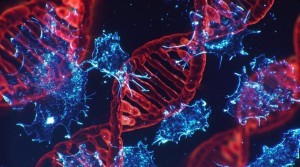Johns Hopkins scientists say they have developed a blood test that spots tumor-specific DNA and protein biomarkers for early-stage pancreatic cancer. The combined “liquid biopsy” identified the markers in the blood of 221 patients with the early-stage disease. Their results, published online the week of Sept. 4 in the Proceedings of the National Academy of Sciences, show that detection of markers from both DNA and protein products of DNA was twice as accurate at identifying the disease as detection of DNA alone.
Such liquid biopsies aim to fish out DNA molecules specific for cancer amid a wide sea of normal DNA circulating in the blood. Tumors tend to shed their mutated DNA into the bloodstream, making it possible for scientists to use genomic sequencing tools to sift through the blood and find such cancer-linked DNA.
Most early-stage pancreatic cancers are found incidentally during an imaging scan and generally cause no symptoms. But the disease is most often found late, when it’s far advanced and resection, or surgery, is not the first treatment option, says Jin He, M.D., assistant professor of surgery at the Johns Hopkins University School of Medicine. “In the past 30 years, we haven’t made much progress in identifying people with resectable cancers,” says He. “If this test’s performance is validated in larger studies, it could be used to identify patients with early, asymptomatic pancreatic cancer.”
While their test is not ready to be used outside of a research setting, they say, mutated DNA of the type that is shed from tumors and found in blood is “exquisitely specific” for cancer. “If cancer-linked DNA can be found in the blood of an individual, it is very likely that person has cancer,” says Bert Vogelstein, M.D., co-director of the Ludwig Center at the Johns Hopkins Kimmel Cancer Center. Studies by Vogelstein’s team and others have shown that DNA can be identified in the blood of more than 85 percent of patients with advanced cancers. However, the sensitivity of detecting such small bits of DNA in the blood of patients with early cancers, without prior knowledge of the genetic status of the cancers, was unknown prior to this study, say the scientists.
In their new study, blood and tumor tissue samples were collected from 221 men and women, mostly Caucasians, with stage I and II pancreatic cancers who underwent surgery to remove their pancreas at hospitals in Australia, Korea, Indiana, Pittsburgh, the Mayo Clinic, Rochester, Memorial Sloan Kettering in New York and The Johns Hopkins Hospital. Another 182 people with no known history of cancer, autoimmune disease or chronic kidney disease donated their blood for the study.
source: medicalexpress.com
Ask me anything
Explore related questions





